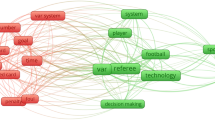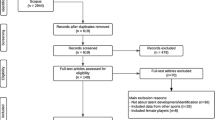Abstract
In this paper, we argue that in a possible world there is a determinate ranking of teams. Our argument rests on the premise: In theory, nothing prevents a determinate better than ranking. This premise in turn rests on assumptions with regard to stipulations regarding ‘better than’ and nature of a competition as well as a right answer theory of interpretation. We then speculate that in some actual leagues in some years, there were determinate rankings. We consider objections that focus on ties, noise, intransitivity, meaning of ‘better than’, and league recognition of the best team. We finish by noting that the issues involved in sport also apply to ranking candidates to occupy roles in our lives.
Similar content being viewed by others
Notes
For the notion that infinity is not a number, see (Huemer, 2016).
An example of a ranking that attempts to compare a team to all other teams in the league is a power ranking. This looks at a team’s record adjusted by the competitive strength of its schedule.
An analogy here might apply to picking out the most valuable player. This might rest on a player’s gross contribution to team wins or on his contribution when compared to an average replacement. In baseball, this might track the distinction between (1) the aggregation of runs and runs batted in (RBI) and (2) wins above replacement (WAR). For a discussion of the most valuable player, see [], [], and [].
Thing labeled ‘A’ and thing labeled ‘B’ are numerically (strictly) identical if and only if they are one and the same thing simpliciter. Consider, for example, the person labeled ‘Mark Twain’ and the person labeled ‘Samuel Clemens’.
For a classic discussion of mereological essentialism, see (Chisholm, 1973).
For a version of this distinction, see (Cherry, 1973).
For discussion of this issue, see PGA Tour, Inc. v. Martin, 532 U.S. 661 (2001).
On a side note, we think that league owners stipulate the rules because they own the game, but nothing in our argument rests on this claim.
See Searle (1997).
For an exploration of random factors in NBA shooting, see (Gilovich, Tversky, & Vallone, 1985).
This example is from the literature on trash-talking in sport see Dixon (2008).
See Bordner (2016).
We are grateful to the extremely helpful comments and criticisms of by paper by Neil Feit and David Hershenov.
References
Bordner, S. S. (2016). All-things-considered’, ‘Better-than’, and sports rankings‘. ‘All-things-considered’, ‘better-than’, and sports rankings. Journal of the Philosophy, 43(2), 215–232.
Chang, R. (2002). The possibility of parity. Ethics, 112(4), 659–688.
Cherry, C. (1973). Regulative rules and constitutive rules. The Philosophical Quarterly, 23(93), 301–315.
Chisholm, R. (1973). Parts as essential to their wholes. Review of Metaphysics, 26, 581–603.
Dixon, N. (2008). “Trash talking as irrelevant to athletic excellent: response to summers,” Journal of the Philosophy of Sport, 35 (1), 90–96.
Dworkin, R. (1967). The model of rules. The University of Chicago Law Review, 35(1), 14–46.
Dworkin, R. (1986). Law’s empire. Belknap Press of Harvard University Press.
Feferman, S., Dawson, J., Kleene, S., Moore, G., Solovay, R., & van Heijenoort, J. (Eds.). (n.d.). Kurt Gödel: Collected works (Vol. 1). 1986, Oxford University Press.
Gilovich, T., Tversky, A., & Vallone, R. (1985). The hot hand in basketball: On the misperception of random sequences. Cognitive Psychology, 17, 295–314.
Hart, H. (1994). The concept of law (2nd ed.). Oxford University Press.
Huemer, M. (2016). Approaching infinity. Palgrave Macmillan.
Hurka, T. (1982a). Average utilitarianisms. Analysis, 42, 65–69.
Hurka, T. (1982b). More average utilitarianisms. Analysis, 42, 115–119.
Rachels, S. (2005). Counterexamples to the transitivity of better than. In T. Rønnow-Rasmussen & M. J. Zimmerman (Eds.), Recent work on intrinsic value (pp. 249–265). Springer.
Russell, J. S. (1999). “Are rules all an umpire has to work with?,” Journal of the Philosophy of Sport, 26 (1), 27–49.
Searle, J. (1997). The construction of social reality. Free Press.
Simon, R. (2000). Internalism and internal values in sport. Journal of the Philosophy of Sport, 27(1), 1–16.
Simon, R. (2016). The ethics of sports: What everyone needs to know. Oxford University Press.
Tempkin, L. (1987). Intransitivity and the mere addition paradox. Philosophy and Public Affairs, 16(2), 138–187.
Vallentyne, P. (1993). Utilitarianism and infinite utility. Australasian Journal of Philosophy, 71, 212–217.
Vallentyne, P., & Kagan, S. (1997). Infinite value and finitely additive value theory. The Journal of Philosophy, 94, 5–26.
Acknowledgements
We are grateful to the extremely helpful comments and criticisms of by paper by Neil Feit and David Hershenov.
Funding
None.
Author information
Authors and Affiliations
Corresponding author
Ethics declarations
Conflicts of Interest
The authors declare that they have no conflict of interest.
Additional information
Publisher's Note
Springer Nature remains neutral with regard to jurisdictional claims in published maps and institutional affiliations.




